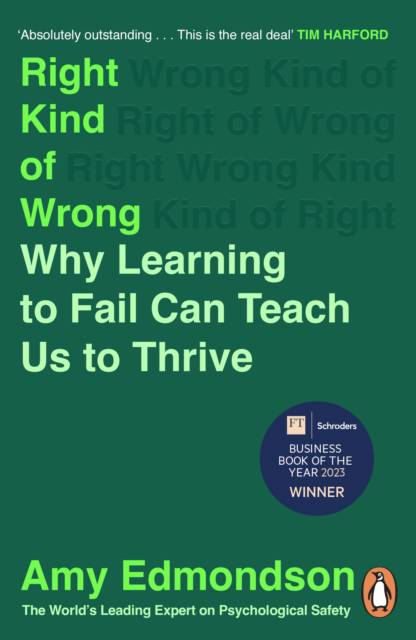
- Afhalen na 1 uur in een winkel met voorraad
- Gratis thuislevering in België vanaf € 30
- Ruim aanbod met 7 miljoen producten
- Afhalen na 1 uur in een winkel met voorraad
- Gratis thuislevering in België vanaf € 30
- Ruim aanbod met 7 miljoen producten
Zoeken
€ 15,45
+ 30 punten
Uitvoering
Omschrijving
Winner of Thinkers50 ‘World’s Most Influential Management Thinkers’
Financial Times Business Book of the Year Award
‘Absolutely outstanding’ Tim Harford, author of The Undercover Economist
‘A masterclass’ Angela Duckworth, author of Grit
‘Groundbreaking’ Forbes
We used to think of failure as a problem, to be avoided at all costs. Now, we're often told that failure is desirable - that we must ‘fail fast, fail often’. The trouble is, neither approach distinguishes the good failures from the bad. As a result, we miss the opportunity to fail well.
Here, Amy Edmondson – the world’s most influential organisational psychologist – reveals how we get failure wrong, and how to get it right. Drawing on four decades of research into the world’s most effective organisations, she unveils the three archetypes of failure – basic, complex and intelligent - and explains how to harness the revolutionary potential of the good ones (and eliminate the bad). Along the way, she poses a simple, provocative question: What if it is only by learning to fail that we can hope to truly succeed?
‘Lays out a clearer path about how to stop avoiding failure and take smarter risks.’ Books of the Year, Financial Times
Financial Times Business Book of the Year Award
‘Absolutely outstanding’ Tim Harford, author of The Undercover Economist
‘A masterclass’ Angela Duckworth, author of Grit
‘Groundbreaking’ Forbes
We used to think of failure as a problem, to be avoided at all costs. Now, we're often told that failure is desirable - that we must ‘fail fast, fail often’. The trouble is, neither approach distinguishes the good failures from the bad. As a result, we miss the opportunity to fail well.
Here, Amy Edmondson – the world’s most influential organisational psychologist – reveals how we get failure wrong, and how to get it right. Drawing on four decades of research into the world’s most effective organisations, she unveils the three archetypes of failure – basic, complex and intelligent - and explains how to harness the revolutionary potential of the good ones (and eliminate the bad). Along the way, she poses a simple, provocative question: What if it is only by learning to fail that we can hope to truly succeed?
‘Lays out a clearer path about how to stop avoiding failure and take smarter risks.’ Books of the Year, Financial Times
Specificaties
Betrokkenen
- Auteur(s):
- Uitgeverij:
Inhoud
- Aantal bladzijden:
- 368
- Taal:
- Engels
Eigenschappen
- Productcode (EAN):
- 9781847943781
- Verschijningsdatum:
- 30/05/2024
- Uitvoering:
- Paperback
- Afmetingen:
- 133 mm x 199 mm
- Gewicht:
- 261 g

Alleen bij Standaard Boekhandel
+ 30 punten op je klantenkaart van Standaard Boekhandel
Beoordelingen
We publiceren alleen reviews die voldoen aan de voorwaarden voor reviews. Bekijk onze voorwaarden voor reviews.











